Parents are being prevented from vaccinating their children because of obstacles such as difficulty booking appointments and a lack of reminders on what jabs are needed and when, a report suggests. Child health experts say "practical or logistical reasons" are discouraging families more often than fears over the vaccines. Vaccine uptake in the UK has fallen over the last decade, leading to outbreaks of measles and whooping cough. UK health officials say they are committed to working with the NHS to improve vaccine uptake among children. Since 2022, no childhood vaccine in the UK has met the World Health Organisation target of 95% of children vaccinated, which ensures protection of vulnerable people. As a result, measles and other preventable diseases have made a comeback. A commission of experts from the Royal College of Paediatrics and Child Health (RCPCH) spent a year looking at why. Dr Helen Stewart, officer for health improvement at RCPCH, said the steady decline in vaccination rates in a wealthy country like the UK was "extremely concerning". But she said vaccine hesitancy, when parents waver over getting their children vaccinated, "is only part of a very complex picture". "The reality is that there are many who simply need better support and easier access to appointments," Dr Stewart said. Although confidence in vaccines is still relatively high, the report found barriers to accessing jabs are why many families don't protect their children. Some of the most common barriers include: "One of the findings of this new report is that parents have no easy way to check their child's vaccination status," says children's emergency medicine specialist, Dr Stewart. "When I ask if the child is up to date with their vaccinations, the most common response is 'I think so'." Poorer families, some ethnic minority groups and migrant communities are much less likely to be vaccinated, and these inequalities have become more obvious since the pandemic, the report says. It also notes an absence of health visitors often means parents have no one they feel comfortable discussing vaccines openly with. The report recommends using NHS apps to improve the experience of booking jabs, investing and expanding vaccination services, and funding health visitors to deliver some of them. It also calls on the development of the'digital red book'to be finalised so parents can keep track of their children's vaccinations. The NHS website liststhe full schedule of vaccinations for children, from babies, up to the age of 15. Dr Julie Yates, deputy director for immunisation programmes at UK Health Security Agency, said plans were in place to improve childhood vaccine uptake by ensuring more flexible appointment booking systems, making vaccines more widely available across different locations, and making access easier in all communities. "Despite the challenges, it is also important to note that parents have high confidence in vaccinations with almost 90% agreeing vaccines are effective," Dr Yates said. Alison Morton, chief executive of the Institute for Health Visitors, said the report presented "a compelling case" to ensure babies and children are protected against serious diseases which can cause so much unnecessary harm. Helen Bedford, professor of children's health at University College London, said improvements needed investment in staff and infrastructure. "Our children have the right to be protected from preventable diseases which can cause illness, disability or even death," she said, adding that a fall in children getting their vaccines had resulted in the deaths of 11 young babies from whooping cough last year. Falling vaccinations among children isn't just an issue in the UK, in 2023 there werenearly 16 million children who had not had any vaccinations, most of them in south Asia and sub-Saharan Africa.
Parents face hurdles vaccinating children - report
TruthLens AI Suggested Headline:
"Report Reveals Barriers to Childhood Vaccination in the UK"
TruthLens AI Summary
A recent report highlights significant barriers that parents face when trying to vaccinate their children in the UK. These obstacles include difficulties in booking appointments and a lack of reminders regarding necessary vaccinations. Health experts emphasize that practical or logistical issues are more discouraging for families than vaccine hesitancy, which has been a concern in recent years. The uptake of childhood vaccinations in the UK has declined over the last decade, leading to alarming outbreaks of preventable diseases such as measles and whooping cough. Since 2022, none of the childhood vaccines have reached the World Health Organization's target of 95% coverage, which is essential for protecting vulnerable populations. Dr. Helen Stewart from the Royal College of Paediatrics and Child Health (RCPCH) noted that while vaccine confidence remains relatively high, many families simply require better support and more accessible appointment options to ensure their children are vaccinated on time.
The report also underscores the disparities in vaccination rates among different demographics, particularly affecting poorer families, ethnic minority groups, and migrant communities. These inequalities have become more pronounced since the COVID-19 pandemic. A lack of health visitors has left many parents without someone to discuss their vaccination concerns openly. To address these challenges, the report recommends enhancing the booking process through NHS apps, expanding vaccination services, and funding health visitors to assist in the vaccination process. Additionally, it calls for the completion of a 'digital red book' that would help parents keep track of their children's vaccination status. Dr. Julie Yates from the UK Health Security Agency assured that efforts are underway to improve access to vaccines through more flexible appointment systems and broader availability across communities. Experts agree that investment in staff and infrastructure is essential to protect children from preventable diseases, which can lead to severe health consequences, including death, as evidenced by recent fatalities from whooping cough among unvaccinated infants.
TruthLens AI Analysis
You need to be a member to generate the AI analysis for this article.
Log In to Generate AnalysisNot a member yet? Register for free.
